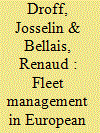|
|
|
Sort Order |
|
|
|
Items / Page
|
|
|
|
|
|
|
| Srl | Item |
| 1 |
ID:
144742


|
|
|
|
|
| Summary/Abstract |
The article focuses on both economics and spatial issues related to Maintenance Repair and Overhaul (MRO) of defence platforms in Europe. Using facts and figures related to costs, trends and fleet sizes evolution, the authors discuss the interest of a spatial reorganisation of MRO production. Given the fiscal situation of the main European countries with a modern army, the relevant scale to consider the reorganisation is certainly Europe. Through the example of defence helicopters fleets of a selection of European countries, the authors address the question of cooperation of the MRO. A greater cooperation in the support of fleets would lead to a spatial reorganisation of MRO. On one side economies can be expected from this reorganisation, but, on the other hand, new problems arise. Specifically, a number of costs associated with different forms of “distances” – geographical, operational and political distances – limit the potential savings that could be expected. This work provides insights on these important issues for the construction of a European defence, both in its political, military and industrial dimensions.
|
|
|
|
|
|
|
|
|
|
|
|
|
|
|
|
| 2 |
ID:
190435


|
|
|
|
|
| Summary/Abstract |
n recent decades, many western countries engaged in Military Operations Abroad (MOA), sometimes with over-stretching military engagements such as antiterrorism, peacekeeping, or humanitarian interventions. These aggressive postures pose a heightened risk to future deployment capacities and the ability to ensure a deterrence strategy in the long run. This study investigates a theoretical model to analyze the sustainability of military operations over time. In our setup, we define military capacity as a stock variable that can regenerate itself and deplete when a country engages in MOA. We present a sustainability theorem with the identification of tipping points in the conduct of MOA. Especially, engaging in excessive military operations leads to a relative ‘demilitarization syndrome.’ This underlines a fundamental trade-off between economic conditions and strategic ambitions. The model sheds some light on the dynamics of the military capabilities of a group of major western military powers.
|
|
|
|
|
|
|
|
|
|
|
|
|
|
|
|
| 3 |
ID:
164527


|
|
|
|
|
| Summary/Abstract |
In the context of restricted budgetary resources and the growing cost of maintenance, repair, and overhaul (MRO) activities, a major issue for modern armed forces is to sustain defense platforms. A possible method consists of realizing economies of scale through the concentration of maintenance activities, which involves the spatial reorganization of existing industrial sites dedicated to MRO. This article provides a formalized framework to discuss the optimal organization for the MRO of defense platforms in space. The public planner organizes the maintenance of defense platforms with only two possible spatial configurations. In the dispersed configuration, two industrial production units in charge of the maintenance optimally cover space, whereas in the concentrated configuration, a unique industrial unit covers space. Focusing on the tipping point between the two configurations, the balance of forces between agglomeration and dispersion in defense support activities is described and discussed. On the one hand, economies of scale provide an opportunity to optimize defense support costs, favoring concentration in a unique industrial unit. On the other hand, space causes dispersion to reduce both transport costs and operational social costs. This trade-off illustrates a general principle in spatial economics with an application to MRO production in the French case.
|
|
|
|
|
|
|
|
|
|
|
|
|
|
|
|
|
|
|
|
|